 There has been much rumblings of discontent from content suppliers to the mobile phone industry, and, as the globally dominant brand, Vodafone have been taking a lot of the flack.
There has been much rumblings of discontent from content suppliers to the mobile phone industry, and, as the globally dominant brand, Vodafone have been taking a lot of the flack.
With sales soaring through the roof, you’d think all would be cream cakes and Earl Grey tea in Mobile Land, but trouble’s been a-brewing concerning the split of income from subscribers for the content.
In a world where content providers are used to calling the shots about product pricing – and the mobile companies are used to a similar position of dominance – an uneasy truce has been maintained, with the best spilt available being 50/50.
Clearly dissatisfied with their lot, content providers have been making long whining noises in the direction of Vodafone. They want more money but – not surprisingly – Vodafone aren’t to keen to dish it out.
 Feeling the pressure, Vodafone have tried to placate their grumbling partners in the short term by dishing out a sizzling barbeque of buzzwords, liberally doused with PR doublespeak.
Feeling the pressure, Vodafone have tried to placate their grumbling partners in the short term by dishing out a sizzling barbeque of buzzwords, liberally doused with PR doublespeak.
We’re not sure if their partners are going to have much of an appetite for what’s on offer – if they can make sense of it – but it seems that Vodafone are offering to spend more on marketing mobile games (without altering their percentage split of the income.)
The extra promotion will clearly be good news for content providers, but the more cynical amongst us will be quick to point out that Vodafone will clearly benefit from the extra publicity too.
 It looks like Tim Harrison, Head of Games at Vodafone Group Services, had been smoking pure Moroccan Buzzword when he came out with this piece of baffling industry-speak: “Having pre-agreed, pan-regional marketing and distribution capacity will allow us to run multi-territory co-marketing more easily, improve efficiencies for our partners and benefit the industry as a whole.”
It looks like Tim Harrison, Head of Games at Vodafone Group Services, had been smoking pure Moroccan Buzzword when he came out with this piece of baffling industry-speak: “Having pre-agreed, pan-regional marketing and distribution capacity will allow us to run multi-territory co-marketing more easily, improve efficiencies for our partners and benefit the industry as a whole.”
Vodafone will be rolling out their grandly titled ‘Marketing and Distribution Plan’ by the end of April, with the remaining Vodafone Operating Companies and partner markets enjoying “maximised marketing and distribution efficiencies” by the end of Q3 2005.
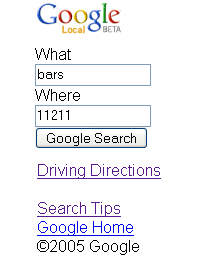 Google is making its local-search service available to mobile-toting users, offering maps and driving directions optimised for the wee screen.
Google is making its local-search service available to mobile-toting users, offering maps and driving directions optimised for the wee screen. Telephone numbers are displayed as a hyperlink, and if the users’ phone supports the facility, clicking on the link will dial the listed telephone number (unlike some local search services, there is no additional charge for this).
Telephone numbers are displayed as a hyperlink, and if the users’ phone supports the facility, clicking on the link will dial the listed telephone number (unlike some local search services, there is no additional charge for this).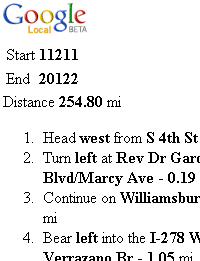 Local search services are set to be the big hot potato of 2005, with the Kelsey Group reporting that local search ad spending hit US$162 million (£85m/€125m) in 2004.
Local search services are set to be the big hot potato of 2005, with the Kelsey Group reporting that local search ad spending hit US$162 million (£85m/€125m) in 2004. I had a Sony W800 Walkman Phone in my hands for the first time today at the Sony Media Experience in Bordeaux. There’s already been a terrific buzz about this camera and it was great to get my hands on the thing during what Sony claims was its first European outing.
I had a Sony W800 Walkman Phone in my hands for the first time today at the Sony Media Experience in Bordeaux. There’s already been a terrific buzz about this camera and it was great to get my hands on the thing during what Sony claims was its first European outing. The central music button is the focus of the handset and, not surprisingly, pressing it takes you straight to your music selection.
The central music button is the focus of the handset and, not surprisingly, pressing it takes you straight to your music selection. The software comes with the handset will take music CDs straight from the player on your machine to handset, without intervention.
The software comes with the handset will take music CDs straight from the player on your machine to handset, without intervention.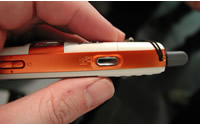
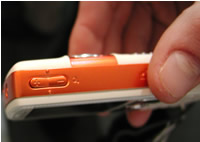

 UK Online is hoping to bring broadband to the masses by smashing the price point for “entry-level” home broadband down to a wallet-untroubling £10 a month.
UK Online is hoping to bring broadband to the masses by smashing the price point for “entry-level” home broadband down to a wallet-untroubling £10 a month. Surfers not used to this level of generosity may be wondering where the catch is, but we haven’t found it yet: we wrote to UK Online and they confirmed that both the Broadband 500 and Broadband 2000 are unlimited services with the Broadband 8000 offering an enormous 500GB monthly download allowance.
Surfers not used to this level of generosity may be wondering where the catch is, but we haven’t found it yet: we wrote to UK Online and they confirmed that both the Broadband 500 and Broadband 2000 are unlimited services with the Broadband 8000 offering an enormous 500GB monthly download allowance. Google has started dishing out factual answers for some queries at the top of its results page, thus sparing click-weary users the hassle of navigating to other sites to look up the information.
Google has started dishing out factual answers for some queries at the top of its results page, thus sparing click-weary users the hassle of navigating to other sites to look up the information. Norvig went on to explain that Google feeds the service with information from Web sites they considers to be reliable, but it’s yet to establish formal relationships with any of the sites providing the content.
Norvig went on to explain that Google feeds the service with information from Web sites they considers to be reliable, but it’s yet to establish formal relationships with any of the sites providing the content.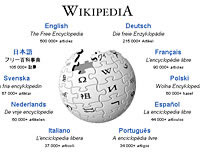 Yahoo’s search engine division has announced that it will be dishing out hardware galore, resources and “critical material aid” to support the non-profit Wikipedia online encyclopedia.
Yahoo’s search engine division has announced that it will be dishing out hardware galore, resources and “critical material aid” to support the non-profit Wikipedia online encyclopedia.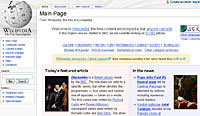 “Their popularity is growing very fast and, accordingly, their bandwidth and hardware needs have increased substantially.”
“Their popularity is growing very fast and, accordingly, their bandwidth and hardware needs have increased substantially.” Comcast Corp. is working with TiVo on an advertising system that will slap new, updated commercials into already-recorded programs.
Comcast Corp. is working with TiVo on an advertising system that will slap new, updated commercials into already-recorded programs. The new technology could help make DVRs more palatable to advertisers and the television networks because it should increase the chances of someone watching an ad rather than fast-forwarding through it.
The new technology could help make DVRs more palatable to advertisers and the television networks because it should increase the chances of someone watching an ad rather than fast-forwarding through it. Under the pact, both companies are free to sell ads on the service, and each retains its respective revenue from any sales.
Under the pact, both companies are free to sell ads on the service, and each retains its respective revenue from any sales. iPod killers, eh? You can barely get out of bed without some hyperbolic company boldly giving their new MP3 player the big one, only to discover that it’s proved as popular as a lager lout on a teatotallers daytrip.
iPod killers, eh? You can barely get out of bed without some hyperbolic company boldly giving their new MP3 player the big one, only to discover that it’s proved as popular as a lager lout on a teatotallers daytrip. When it comes to battery life, the Sony has taken the iPod around the back of the bike sheds and given it a good thumping.
When it comes to battery life, the Sony has taken the iPod around the back of the bike sheds and given it a good thumping. Unlike previous Sony models, the NW-HD5 is based around a portrait design where the seven line, 1.5-inch backlit LCD sits above the controls. In a neat twist, the new ‘Follow Turn Display’ feature automatically orients the interface screen horizontally or vertically depending on which way the player is held.
Unlike previous Sony models, the NW-HD5 is based around a portrait design where the seven line, 1.5-inch backlit LCD sits above the controls. In a neat twist, the new ‘Follow Turn Display’ feature automatically orients the interface screen horizontally or vertically depending on which way the player is held.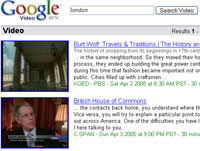 Google plans to invite users to submit personal video clips for archiving as part of its recently launched video search service.
Google plans to invite users to submit personal video clips for archiving as part of its recently launched video search service. The company also announced that it would provide data about popular Web searches to Current, a new television network for the 18- to 34-year-old audience, backed by former US Vice President Al Gore and other investors.
The company also announced that it would provide data about popular Web searches to Current, a new television network for the 18- to 34-year-old audience, backed by former US Vice President Al Gore and other investors. Orange, the UK’s most popular mobile network, has wheeled out the initial line-up for its Great for Music handsets; the Nokia 6680 3G handset, Nokia 3230 and Sony Ericsson K300i handsets.
Orange, the UK’s most popular mobile network, has wheeled out the initial line-up for its Great for Music handsets; the Nokia 6680 3G handset, Nokia 3230 and Sony Ericsson K300i handsets.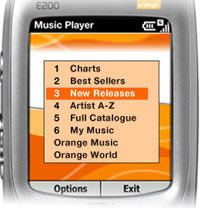 “The Official UK Chart’s decision to include music downloads from Orange World in its Chart demonstrates that the music industry has recognised the rising importance of mobile music downloads within the digital music sphere,” said Mark Ashford, head of music, Orange UK. “The advent of digital music downloads on mobile means that up-to-date phones also act as music players, making digital music accessible for one in three people in the UK.”
“The Official UK Chart’s decision to include music downloads from Orange World in its Chart demonstrates that the music industry has recognised the rising importance of mobile music downloads within the digital music sphere,” said Mark Ashford, head of music, Orange UK. “The advent of digital music downloads on mobile means that up-to-date phones also act as music players, making digital music accessible for one in three people in the UK.”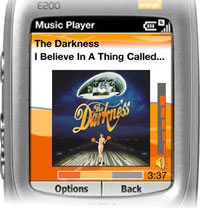 Orange will also be trying to look hip and radical while promoting their corporate brand at the forthcoming Glastonbury and T in the Park events.
Orange will also be trying to look hip and radical while promoting their corporate brand at the forthcoming Glastonbury and T in the Park events.